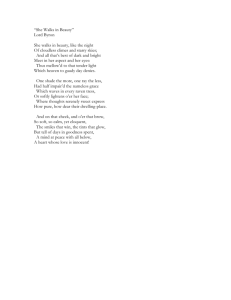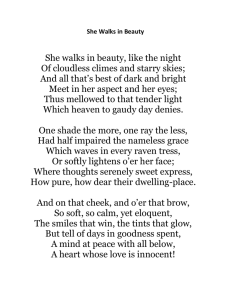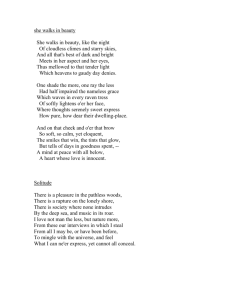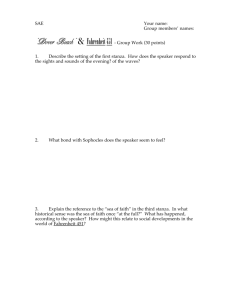KAguilera, Poem Explication
advertisement
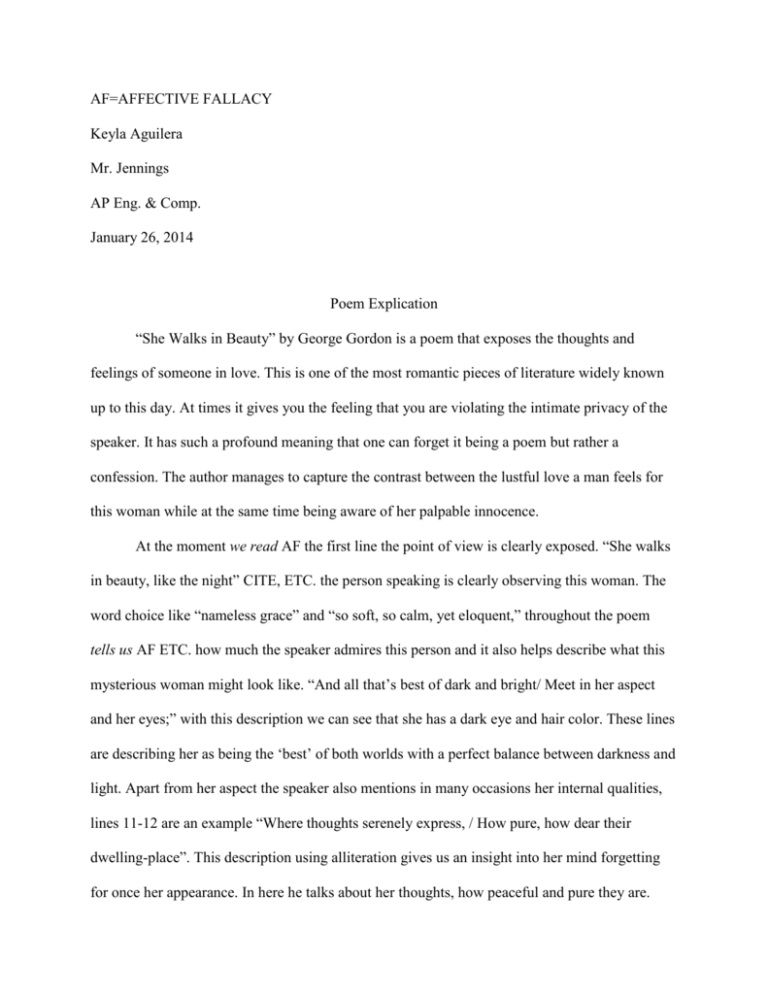
AF=AFFECTIVE FALLACY Keyla Aguilera Mr. Jennings AP Eng. & Comp. January 26, 2014 Poem Explication “She Walks in Beauty” by George Gordon is a poem that exposes the thoughts and feelings of someone in love. This is one of the most romantic pieces of literature widely known up to this day. At times it gives you the feeling that you are violating the intimate privacy of the speaker. It has such a profound meaning that one can forget it being a poem but rather a confession. The author manages to capture the contrast between the lustful love a man feels for this woman while at the same time being aware of her palpable innocence. At the moment we read AF the first line the point of view is clearly exposed. “She walks in beauty, like the night” CITE, ETC. the person speaking is clearly observing this woman. The word choice like “nameless grace” and “so soft, so calm, yet eloquent,” throughout the poem tells us AF ETC. how much the speaker admires this person and it also helps describe what this mysterious woman might look like. “And all that’s best of dark and bright/ Meet in her aspect and her eyes;” with this description we can see that she has a dark eye and hair color. These lines are describing her as being the ‘best’ of both worlds with a perfect balance between darkness and light. Apart from her aspect the speaker also mentions in many occasions her internal qualities, lines 11-12 are an example “Where thoughts serenely express, / How pure, how dear their dwelling-place”. This description using alliteration gives us an insight into her mind forgetting for once her appearance. In here he talks about her thoughts, how peaceful and pure they are. Devices like metaphors, imaginary, alliteration and similes are used to keep harmony. All this helps us visualize the two opposing forces, which in this case is when darkness and light unite to create something different, better even. The image of “starry skies” is for most perceived as a perfect view, the speaker uses this to his advantage by comparing the view to her therefore extending our perception of her beauty. During lines 7-10 the use of imaginary once again keeps the balance and allows us to picture an angelic looking person “One shade the more, one ray the less, / Had half impair’d the nameless grace / which waves in every raven trees, / Or softly lightens o’er her face;”. The words “shade and “ray” are the ones who create the sense of ongoing balance. During the last stanza especially lines 17-18 the speaker reveals something intimate about the woman she is talking about. “A mind at peace with all below,/ A heart whose love is innocent!”. Before this stanza the speaker was determined at describing her in a physical sense, praising her beauty. In the last stanza it takes a turn we are surprised AF when the speaker talks about her in a ‘sexual’ manner by publicly stating that she is a virgin. It makes us, the readers rethink all that has been said before This poem is effective. In the end the speaker is capable of convincing the reader of the how beautifully perfect this woman is. The descriptions used to show this are sometimes contradictory but overall the contradictions are what create the balance making her ‘perfect’ in his eyes. This poem is a spot on example of what someone in love thinks. When in love one tends to blur the defects with the good qualities in a person. In some instances this may carry undesirable consequences however those truly in love learn that those defects is what keeps the good qualities there, without them the good wouldn’t be truly appreciated. Works Cited She Walks in Beauty By Lord Byron (George Gordon) 1-She walks in beauty, like the night 2- Of cloudless climes and starry skies; 3-And all that’s best of dark and bright 4-Meet in her aspect and her eyes; 5-Thus mellowed to that tender light 6-Which heaven to gaudy day denies. 7-One shade the more, one ray the less, 8- Had half impaired the nameless grace 9-Which waves in every raven tress, 10-Or softly lightens o’er her face; 11-Where thoughts serenely sweet express, 12-How pure, how dear their dwelling-place. 13-And on that cheek, and o’er that brow, 14-So soft, so calm, yet eloquent, 15-The smiles that win, the tints that glow, 16 -But tell of days in goodness spent, 17-A mind at peace with all below, 18- A heart whose love is innocent!
